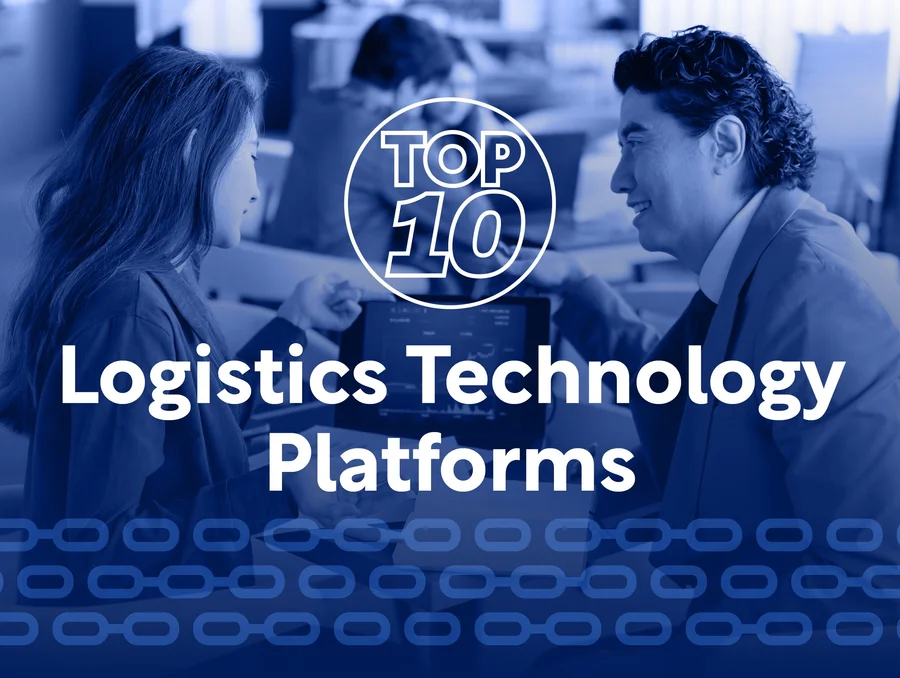Top 10 Logistics Technology Platforms Transforming Supply Chains
Supply Chain Digital explores the top 10 logistics technology platforms that help businesses improve visibility and cut costs.
In today’s fast-moving global market, logistics technology is critical to running a smooth supply chain. These tools help companies work more efficiently by connecting real-time data, improving delivery routes, and enhancing communication across the supply chain.
From tracking inventory to managing freight, these platforms help businesses see what’s happening, cut expenses, and deliver faster. As customer demands grow and operations become more complex, using modern logistics technology is now a must.
Here are the top 10 logistics tech platforms you need to know about:
10. FreightPOP
Founded: 2015
Employees: ~50
CEO: Kurt Johnson
FreightPOP is a cloud-based transportation management system (TMS) built for manufacturers, distributors, and retailers.
It offers a complete platform to handle all areas of shipping, including rate comparisons, booking, tracking, and auditing across various transport modes such as LTL, FTL, parcel, ocean, and air.
FreightPOP connects with over 300 carriers and offers features like real-time tracking, load optimization, automated paperwork, and analytics. It’s scalable, so businesses of all sizes can use it to manage complex shipping needs.
9. Easyship
Founded: 2014
Employees: 175+
CEO: Tommaso Tamburnotti / Augustin Ceyrac
Easyship is a cloud-based shipping tool made for global e-commerce businesses.
It connects users to over 250 couriers, including UPS and DHL, offering savings of up to 91%. Easyship integrates with major eCommerce platforms, syncing orders, printing labels, and updating tracking info automatically.
Other helpful features include real-time shipping rates, customs document automation, and dynamic checkout tools to boost sales conversions.
8. Alvys
Founded: 2020
Employees: 100+
CEO: Nick Darman
Alvys is a cloud-based TMS designed for carriers, brokers, and mixed freight operators.
It solves inefficiencies by offering a modern workflow system and hundreds of integrations. Alvys brings together dispatch, billing, compliance, and reporting in one easy-to-use platform.
According to the company, users have seen load volumes rise by 22% in just four months. It’s a full-featured tool for managing freight operations seamlessly.
7. Magaya
Founded: 2001
Employees: 250+
CEO: Gary R. Nemmers
Magaya provides powerful logistics and supply chain automation tools.
Its cloud-based platform, the Magaya Digital Freight Platform, includes solutions for freight forwarding, warehouse management, customs compliance, rate management, and CRM.
Magaya helps automate repetitive tasks and gives real-time supply chain visibility, helping users save time and money. Its tools can be used separately or together for maximum flexibility.
6. LogiNext
Founded: 2014
Employees: ~250
CEO: Dhruvil Sanghvi
LogiNext is a SaaS logistics automation platform that helps businesses streamline delivery management.
It includes features like route optimization, live tracking, auto-assignment of deliveries, and performance analytics. AI and machine learning help improve last-mile delivery, warehouse operations, and visibility.
LogiNext supports industries such as food and beverage, retail, e-commerce, and courier services, helping smaller businesses compete with larger players on customer experience.
5. Freightos
Founded: 2012
Employees: 370+
CEO: Zvi Schreiber
Freightos is a digital freight marketplace that simplifies global trade.
With its online system, shippers can compare, book, and manage international freight from multiple carriers. It offers instant quotes, automated documents, and tracking tools.
Freightos also runs the Freightos Baltic Index (FBX), which tracks global container freight rates. The platform is used by forwarders, importers, exporters, and carriers worldwide.
4. Shippo
Founded: 2013
Employees: 300
CEO: Laura Behrens Wu
Shippo began as an e-commerce store idea but quickly pivoted into a shipping solution after the founders saw how hard shipping could be.
Today, over 100,000 brands use Shippo’s multi-carrier software, which helps save up to 90% on shipping labels.
Shippo provides access to shipping rates, label printing, international document automation, package tracking, returns management, and more—all in one place.
3. Uber Freight
Founded: 2017
Employees: 5,200
CEO: Lior Ron
Uber Freight brings a modern tech approach to logistics, with tools for businesses of all sizes to improve delivery visibility and control.
The Uber Freight TMS includes features like shipment tracking, weather and traffic data, performance metrics, and disruption alerts.
Its Parcel TMS platform helps manage parcel shipping from start to finish, supported by a team of logistics experts available 24/7.
2. Kinaxis
Founded: 1984
Employees: 1,780
CEO: John Sicard
Kinaxis offers a powerful AI-driven supply chain platform called Maestro (formerly RapidResponse).
This cloud-based tool provides full supply chain visibility and better demand planning. Key features include:
- Real-time end-to-end visibility
- AI-powered analytics for smarter decisions
- Scenario planning to model outcomes
- Synchronized planning of supply, demand, and capacity
- Collaboration tools
- Automated workflows
Kinaxis helps businesses control their supply chains—from planning to final delivery.
1. Oracle
Founded: 1977
Employees: 159,000
CEO: Safra Catz
Oracle’s logistics platform is part of its Fusion Cloud Supply Chain & Manufacturing (SCM) suite.
Oracle Cloud Logistics offers a full set of tools for transportation, global trade, and warehouse operations. It includes transportation planning, trade compliance, customs management, and warehouse management.
With Oracle, businesses gain visibility into orders, shipments, and inventory while optimizing how goods move across all transport types. The platform also offers supply chain analytics, helping businesses stay efficient, reduce costs, and meet customer expectations.
Industry Insights
news via inbox
Nulla turp dis cursus. Integer liberos euismod pretium faucibua









[…] a software solution designed to help businesses control and optimize warehouse operations, such as inventory management, order fulfillment, and labor management. A WMS offers end-to-end visibility and control over the […]
[…] trade compliance may sound like a back-office function, its impact ripples across procurement, logistics, sales, finance, and legal […]